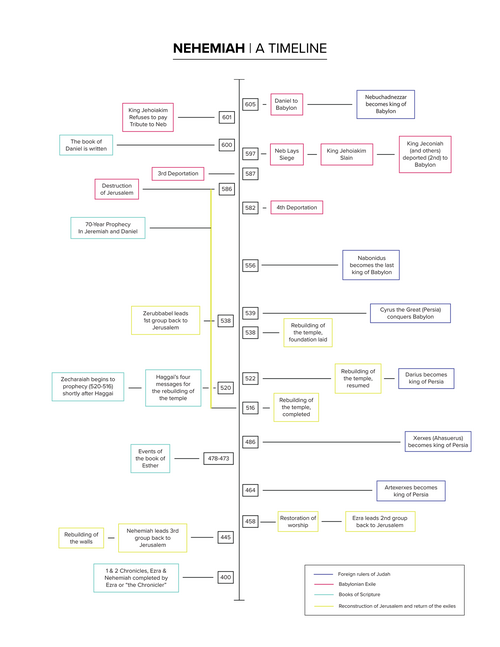Nehemiah : WK 1 - FRI
Questions
Nehemiah 1:2
Hanani, one of my brothers, came to visit me with some other men who had just arrived from Judah. I asked them about the Jews who had returned there from captivity and about how things were going in Jerusalem.
I have a longtime friend, Phil, who routinely finds himself in the most amazing conversations. Whether it’s with close friends or perfect strangers, if I step away for a moment, upon my return, he will be fathoms deep, receiving scientific explanations I don’t understand, unraveling the mysteries of parenting, or concluding a discovery about the seven degrees of separation that reveals a networked web of relationships.
For a long time, I wondered how he managed to do this so effortlessly. As I watched and studied Phil’s approach, it occurred to me. He has a natural curiosity about people. He is slow to blurt out his thoughts and quick to ask questions.
Intrigued by the power of this technique, I began to look for it in others. Time and again, I have observed that the best leaders and high achievers have mastered the art of asking great questions.
As our story begins, Nehemiah entertains visitors returning from Jerusalem to Susa. By most measures, Nehemiah is the most important person in the room. However, he refrains from boasting about his personal achievements, the influential people he has met, and the difference he is making in the kingdom. Instead, the fourth sentence of this book starts, “I asked.” The impact of Nehemiah’s story rests entirely on his use of these two words.
There are many things in this world, within my church community, and in my life that could use some change. But maybe, before I rush to share my brilliant observations on how to save the day, I should take a cue from Phil and Nehemiah. I should start by asking questions.
Nehemiah 1:2
Hanani, one of my brothers, came to visit me with some other men who had just arrived from Judah. I asked them about the Jews who had returned there from captivity and about how things were going in Jerusalem.
I have a longtime friend, Phil, who routinely finds himself in the most amazing conversations. Whether it’s with close friends or perfect strangers, if I step away for a moment, upon my return, he will be fathoms deep, receiving scientific explanations I don’t understand, unraveling the mysteries of parenting, or concluding a discovery about the seven degrees of separation that reveals a networked web of relationships.
For a long time, I wondered how he managed to do this so effortlessly. As I watched and studied Phil’s approach, it occurred to me. He has a natural curiosity about people. He is slow to blurt out his thoughts and quick to ask questions.
Intrigued by the power of this technique, I began to look for it in others. Time and again, I have observed that the best leaders and high achievers have mastered the art of asking great questions.
As our story begins, Nehemiah entertains visitors returning from Jerusalem to Susa. By most measures, Nehemiah is the most important person in the room. However, he refrains from boasting about his personal achievements, the influential people he has met, and the difference he is making in the kingdom. Instead, the fourth sentence of this book starts, “I asked.” The impact of Nehemiah’s story rests entirely on his use of these two words.
There are many things in this world, within my church community, and in my life that could use some change. But maybe, before I rush to share my brilliant observations on how to save the day, I should take a cue from Phil and Nehemiah. I should start by asking questions.
- Who do you know that asks great questions?
- What challenges or tasks are you facing right now? What key questions should you think about asking?
- What question(s) are you currently asking God? What question(s) are you avoiding asking Him? Consider journaling the possibilities of His responses.


No Comments